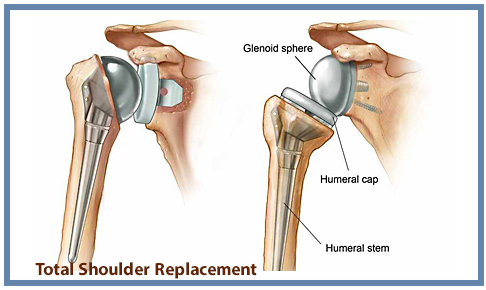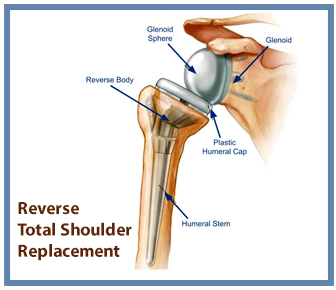There are two mains types of shoulder replacements.
I) Total Shoulder Replacement
A traditional total shoulder replacement involves replacing the arthritic joint surfaces. The surgery may require the replacement of just the head of the humerus bone (ball) or replacement of both the ball and the socket (glenoid). The prosthesis may be either cemented or ‘press-fit’ into the bone.
Various conditions cause shoulder pain and disability requiring shoulder joint replacement surgery. Osteoarthritis, rheumatoid arthritis, avascular necrosis, rotator cuff tear arthropathy, and severe fractures cause shoulder pain.
II) Reverse Total Shoulder Replacement
Patients with severe rotator cuff injuries advance into a type of arthritis called rotator cuff tear arthropathy. Here, the movement of the upper arm causes wear-and-tear leading to a painful condition. It even limits the range of motion in the shoulder. In this case, since the problematic rotator cuff can no longer hold the humeral head in the glenoid socket, a reverse total shoulder replacement is required.
To stabilize the damaged joint, the orthopedic surgeon reverses the orientation of the ball-and-socket. The surgeon removes the ball at the top of the humerus and replaces it with a metal ball. He then attaches it to the shoulder blade instead of with the humerus. Since the prosthetic socket is attached to the top of the humerus, it is called a reverse shoulder replacement.
When is Shoulder Replacement Surgery Recommended?
Here are some of the reasons why the best doctor for shoulder replacement in Mumbai may recommend total shoulder replacement surgery. These signs and symptoms include:-
- Severe shoulder pain that interferes with daily activities.
- Ongoing moderate to severe pain even while resting.
- Lesser motion or weakness in the shoulder.
- Pain caused by arthritis or when the shoulder is severely fractured or broken.
Total shoulder replacement surgery is recommended when the patient’s condition fails to improve with other treatments such as anti-inflammatory medications, cortisone injections, or physical therapy.
Shoulder replacement surgery is used to treat various shoulder disorders.
Procedure for Shoulder Replacement
Leading orthopaedic surgeons in India have been successfully operating for total shoulder replacement. In a traditional total shoulder replacement surgery, the surgeon replaces the damaged ball-and-socket shoulder joint with the prosthetic material. The humeral head (ball) gets replaced with a metal prosthesis and the glenoid (socket) replaced with a medical-grade plastic prosthesis. The surgery takes about three hours under general anaesthesia. In reverse shoulder replacement surgery, the orthopaedic surgeon reverses the orientation of the ball-and-socket joint.
Post-operative Care for Shoulder Replacement
The surgeon will provide instructions for post-operative care for the shoulder to heal fast. Some of these may include:
- Wear an arm-sling for two weeks or as advised by your surgeon
- Bend and straighten your elbow frequently and make a fist to help keep your circulation flowing.
- Use the arm to perform daily activities like eating, writing, or shaving, but do not lift any heavy items.
- Do not drive till about six weeks after the surgery.
To know more about Total Shoulder Replacement in Mumbai, visit the HKS clinic for a consultation today or you can WhatsApp us on +91-9821257676



